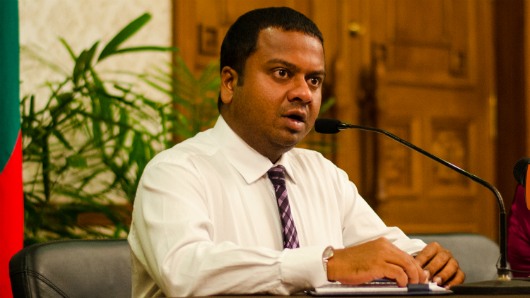The government has dismissed US Secretary of State John Kerry’s comments over threats to democracy in the Maldives as his personal views.
Speaking to Haveeru, acting foreign minister Mohamed ‘Mundhu’ Hussain Shareef said the US government had not officially shared the concerns with the government and insisted Kerry’s remarks were his own opinion.
“We have strong relations with America,” he was quoted as saying by Haveeru.
Kerry’s comments came after clashes erupted between protesters and police following a historic antigovernment protest on Friday. Nearly 200 protesters were arrested.
“We’ve seen even now how regrettably there are troubling signs that democracy is under threat in the Maldives where the former president Nasheed has been imprisoned without due process,” Kerry told the press in Sri Lanka on Saturday.
“This is an injustice that needs to be addressed soon.”
Shareef was unavailable for comment today.
The president’s office spokesperson Ibrahim Muaz also declined to comment.
Nasheed is serving a 13 year jail term on terrorism charges. The trial was widely criticised by foreign governments, international bodies and human rights groups.
Kerry had met with Nasheed’s wife, Laila Ali in Washington before his visit to Sri Lanka.
Nasheed’s international lawyers have asked the UN working group on arbitrary detention to rule the opposition leader’s arrest arbitrary and illegal.
Nasheed’s arrest on february 22 sparked daily protests across the country. The Jumhooree Party and the Adhaalath Party split from the ruling coalition and allied with Nasheed’s Maldivian Democratic Party over increased authoritarian tactics by the government.
Approximately 20,000 protesters took to the streets on Friday against the government’s ‘tyranny.’ The march is the largest antigovernment action in the past decade. Clashes erupted when protesters attempted to enter the city’s main Republic square at dusk.
Police used stun grenades, thunder flashes, tear gas and pepper spray to disperse the crowds and confrontations continued into the early hours. Scores were injured, 193 people arrested and two policemen severely beaten by protesters.
Later that night, police arrested Adhaalath Party president Sheikh Imran Abdulla, deputy leader of JP Ameen Ibrahim and MDP chairperson Ali Waheed.
The police have said the opposition must give prior notice before holding a protest.
Meanwhile the UN human rights office on Friday said Nasheed’s trial was “vastly unfair, arbitrary and disproportionate.”
Briefing the press in Geneva, Mona Rishmawi, who heads the office on rule of law, equality and non-discrimination, said Nasheed’s 19-day trial was politically motivated and was reached by judges wielding “incredible discretionary powers.”
The European parliament has also passed a resolution urging the government to release Nasheed immediately.
However, the government remains defiant, with the foreign minister saying President Abdulla Yameen’s government will not comply with demands from foreign governments to “meddle” in judicial affairs and release a convict.
In an interview with state broadcaster TVM, Dunya Maumoon said the Maldives would become “enslaved” and lose its independence if the government accepted such demands.
Foreign governments do not wish well for the Maldives, she continued and called on the public to protect the country’s institutions, independence and sovereignty.
